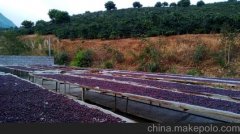A brief introduction to the treatment methods of grinding degree and roasting degree of world-famous coffee from Rwanda

Indeed, coffee places the hopes of the people of Rwanda. They hope to increase coffee exports to promote the country's economic development, and they also hope that the two major tribes, the Hutu and the Tutsi, who once killed each other, will work together to grow coffee, eliminate gratitude and hatred, and jointly build a better tomorrow. After tasting Rwanda bourbon carefully, I think it tastes really good and is worth recommending.
Recommended item [RwandaWestProvinceRutsiroMushonyiCWSBourbon]
[product name]: Rwanda bourbon boutique coffee
[quality rating]: AA
[baking degree]: recommended baking degree city or deep city baking
[grade]: good
[particles]: ★★ plump
[acidity]: ★★★ micro acid
[equilibrium]: ★★★ stable
[coffee producing areas]: Lutesilo producing areas in the western province of Rwanda
[planting altitude]: 1500-1800 m
[raw bean variety]: BM-139 (bourbon) species
[raw bean treatment]: washing, sun drying of elevated scaffolding
[flavor characteristics]: red apple, cherry, cinnamon, honey
Because of the dense mountains and humid climate in Rwanda, the coffee beans produced in Rwanda are rich in aroma, naturally fruity and floral.
There are five major coffee producing areas in Rwanda, and the coffee produced in these five regions is slightly different in aroma and taste. The coffee from Rwanda tastes sour, but it has a lingering aftertaste. "good coffee is like Chinese tea. It feels sweet only after drinking it." Mustafari said. Starbucks, a well-known coffee chain, also imports some of its raw materials from Rwanda. Mustafari said that although Rwandan coffee has not yet officially entered the Chinese market, they are working hard and are expected to give China a taste of authentic Rwandan coffee within two years.
Coincidentally, Bonilo, a female tourist from Atlanta, USA, hurried to the Rwanda Pavilion. "this is the last day of my two-week trip to China. My mother is a coffee lover. I have to bring back some good coffee for her. I was recommended Rwandan coffee, so I came here. " When Mustafari learned of this, he generously presented a bag of Rwandan coffee to Bonilo, who thanked him with delight.
Rwanda is known as the "country of a thousand hills". It is full of mountains and plateaus, and most areas are tropical plateau climate and savanna climate, which is mild and cool. There are about 33000 hectares of coffee plantations and 500000 people are engaged in the coffee industry. Rwanda is the only country in the world that can fully enjoy the harmony of soil-altitude-climate. Rwanda has unique conditions for growing Arabica coffee. Fertile volcanic soil, adequate rainfall and the right temperature all year round make our coffee taste different.
The beautiful country of thousands of hills Rwanda has a long and rich culture for growing highland coffee, mainly high-quality Arabica coffee. Rwanda accounts for 20% of the total coffee production and is also very popular in the international market. In this unique growing environment, high-quality coffee from Rwanda has a distinctive taste and aroma. According to Karuritwa, marketing and promotion officer of the Rwandan Coffee Association, Rwanda plans to export 3000 tons of coffee this year, further increasing coffee production to meet the increasing market demand. Starbucks, the world's largest coffee and beverage retailer, has also partnered with the Rwandan government to import Rwanda coffee, just as a brown pigeon flies from its cup against the line "Cup of Hope".
Bourbon coffee grown in Lutesilo in the western province of Rwanda is one of the original varieties of Arabica coffee. With its high-quality washed Arabica coffee beans, it is eye-catching and more and more famous in the international market.
Like many African countries, Rwandan coffee is mainly produced by small farmers, and the ripe cherry fruits are collected and sent to the processing station every year during the harvest period. Mushonyi (Muxiuyi) processing plant has an amazing award record. Apart from winning the COE Excellence Cup in 2010, it won the championship, 12th, 16th and 28th in four batches in 2011 alone! During the annual harvest period, the ripe coffee berries picked by farmers are concentrated in the treatment station for treatment, first selected by hand to ensure that no immature or damaged fruit is mixed in. Then remove the pericarp, wash the pectin in the channel after 12-18 hours of washing and fermentation in a cool and low temperature environment. During the drying process of the scaffolding, the members of the treatment station will turn manually and take care of them carefully to ensure that the raw beans with shells will not lose moisture or dry unevenly in sufficient sunlight, until the moisture content stability of raw beans is reduced to less than 14%.
The taste of Rwandan coffee is described as "grass aroma" with tropical climate characteristics. In addition to the sweetness of fruit, this coffee also gives people a feeling of freshness, clearness and freshness. Bourbon coffee grown in Rwanda is amazing for its sweet fruit, full-bodied, unrestrained and lingering aftertaste. This coffee has a delicious, citrus sweetness and a deep chocolate color, with red apples, cherries, cinnamon and honey, high sweetness and balance, cinnamon, almonds and chocolate finish.
Important Notice :
前街咖啡 FrontStreet Coffee has moved to new addredd:
FrontStreet Coffee Address: 315,Donghua East Road,GuangZhou
Tel:020 38364473
- Prev

A brief introduction to the market price of Rwanda boutique bourbon coffee varieties with full grains
Flavor: soft, strong aroma, full granule suggested roasting method: deep roasting ★★: market for good Rwandan coffee: Rwanda (Rwanda) coffee is absolutely high quality in the form of washed Arabica beans. As far as Africa is concerned, its coffee industry is remarkable because the country thrives mainly by producing the best possible coffee beans. Coffee from Rwanda is on the international market
- Next

Green grass fragrant Rwanda maraba fine coffee cultivation climate altitude profile
Rwanda Karnogi coffee is grown and harvested by local smallholders and washed by Gitesi Washing Station. Although this is a relatively young coffee processing plant, it has always been famous for producing high quality Rwandan coffee due to its responsible working attitude, good processing equipment and standardized processing procedures.
Related
- Does Rose Summer choose Blue, Green or Red? Detailed explanation of Rose Summer Coffee plots and Classification in Panamanian Jade Manor
- What is the difference between the origin, producing area, processing plant, cooperative and manor of coffee beans?
- How fine does the espresso powder fit? how to grind the espresso?
- Sca coffee roasting degree color card coffee roasting degree 8 roasting color values what do you mean?
- The practice of lattes: how to make lattes at home
- Introduction to Indonesian Fine Coffee beans-- Java Coffee producing area of Indonesian Arabica Coffee
- How much will the flavor of light and medium roasted rose summer be expressed? What baking level is rose summer suitable for?
- Introduction to the characteristics of washing, sun-drying or wet-planing coffee commonly used in Mantenin, Indonesia
- Price characteristics of Arabica Coffee Bean Starbucks introduction to Manning Coffee Bean Taste producing area Variety Manor
- What is the authentic Yega flavor? What are the flavor characteristics of the really excellent Yejasuffi coffee beans?

